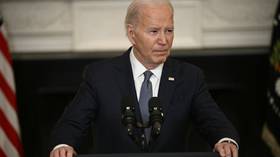Only one power could stop Israel’s Rafah invasion – but it dropped the ball

Israel has been threatening a full-scale invasion of the Gazan city of Rafah for months, with the US government belatedly warning against the move and calling for a ceasefire. However, the Biden administration has consistently flip-flopped on the issue and refused to take serious measures to pressure Israel into reaching a deal.
On May 6, Hamas publicly announced that it had accepted a ceasefire proposal, triggering celebrations throughout Gaza. The rejoicing was short-lived though, as the Israeli government reiterated its refusal to accept a deal and pledged instead to launch a ground operation in Gaza’s southernmost city, despite US government objections.
Israeli Prime Minister Benjamin Netanyahu even stated that “the day after is the day after Hamas. All of Hamas,” meaning there is no ceasefire deal he will accept.
Despite the Israeli military capturing the Rafah Crossing between Gaza and Egypt, in addition to killing dozens of civilians after bombing 100 targets throughout Rafah, Israel announced that a delegation had been sent to Cairo to “exhaust” all possibilities of reaching a ceasefire. As it would later turn out, the ceasefire proposal that Hamas accepted was almost identical to one drafted by the CIA and Israeli intelligence, and lauded by US Secretary of State Antony Blinken as a “strong proposal”.
Meanwhile, in cities like Haifa and Tel Aviv, Israeli protesters – led by the families of captives held in Gaza – had taken to the streets to demand their government accept the ceasefire terms, which included the release of all Israeli prisoners. Clashing with the police and labeling the Netanyahu government liars, the demonstrators threatened to burn the country if their prisoners were not freed.
The US response the very next day was to gaslight reporters by telling them that the whole world was wrong and that Hamas had not accepted any ceasefire proposal. It was not long before US President Joe Biden was to sit down for an interview with CNN and state that he would not supply Israel with offensive weaponry to be used in a “major invasion” of Rafah. What he refused to do, however, was define what a major invasion means – and where the red line is.
This unclear approach comes after the Israeli military violated the terms of the 1979 Camp David agreement, which normalized ties between Egypt and Israel, by invading what is known as the Philadelphi Corridor in southern Gaza. Not only did the Israeli army send in its Givati Brigades, who published videos of themselves recklessly crushing the border crossing for fun, they also sealed off the key aid route to Gaza’s civilian population, who are on the brink of famine.
A weak and confusing American approach
The Israeli government has been threatening to invade Rafah since the start of the year, with Benjamin Netanyahu repeatedly asserting, since the beginning of February, that Israel will “lose the war” if there is no invasion. it's a move that the US not only says will mean defeat militarily, but more importantly, threatens the lives of over a million civilians, most of whom have nowhere else to go.
In early March, Biden gave a confusing interview to MSNBC, where he repeatedly contradicted himself when addressing the issue of an Israeli invasion of Rafah.
While claiming that entering Rafah is a “red line,” he then said that “there’s no red line [where] I’m going to cut off all weapons... but there’s red lines that if he crosses them”, before he seemed to lose his train of thought.
The sudden changes in the stance of policymakers in Washington are not limited to Biden’s MSNBC interview. In early February, the US said it would oppose an invasion of Rafah, calling it a “disaster,” to which the Israeli prime minister responded that he was preparing his forces to invade – and ramped up aerial attacks on the area. Yet, in mid-February the US government prepared a $14 billion military aid package for Israel and would go on to say that it could only support a limited invasion of Rafah.
Then there were reports that emerged, citing unnamed US officials, alleging that Biden was growing frustrated with Netanyahu and that he had even sworn at him. There was then the American push towards a “six-week ceasefire” in March, which the US president publicly said he hoped would happen prior to the Muslim Holy month of Ramadan. Even now, the Biden administration is still talking about an alleged “six-week ceasefire”, despite its own proposal to Hamas being a detailed agreement designed to end the war or at least to last for several months.
Silently, the US approved over 100 weapons transfers to assist the war effort against Gaza, in which they used loopholes to avoid Washington’s own new laws on weapons sales. Then, with two weeks left until the end of Ramadan, the US finally abstained in a United Nations Security Council (UNSC) vote, which called on Israel to implement a ceasefire until the end of the Muslim Holy month. In response, Israel immediately canceled the pre-planned visit of a high-level American delegation to Tel Aviv.
However, the very next morning, following the passing of the UN Security Council resolution, the US State Department announced that the resolution was non-binding. This not only meant that Washington was denying the reality of the internationally understood consensus that all UNSC votes are by their nature binding, but also that it would allow Israel to violate the resolution. So, even though Washington technically took a measure to pressure its ally temporarily, the very next day it gave an informal veto of the resolution, signaling to the Israeli government that it would retain American support no matter what.
While admitting that an invasion of Rafah will inevitably lead to the mass killing of Palestinian civilians, and block humanitarian aid transfers during an impending famine, and that it will not lead to the collapse of Hamas or the return of Israeli prisoners, the US government is effectively twiddling its thumbs.
The US has had nearly seven months to formulate a coherent policy when it comes to its goals and red lines in the Gaza-Israel war, yet it cannot articulate what its red lines are – and what ceasefire it even desires – without constantly contradicting itself. Western corporate media are now pointing to the postponing of a singular weapons shipment to Israel by the Biden administration, as if this constitutes pressure. But the US has done nothing to force Israel to allow aid to pass through the Rafah Crossing, which it immediately called upon Israel to do.
At this point, the US government is not helping to achieve Israel’s publicly stated war aims, it is not helping the families of Israeli prisoners, and it has failed to achieve a ceasefire or the sufficient transfer of humanitarian aid into Gaza. Instead, Joe Biden appears to be doing one thing – helping Benjamin Netanyahu prolong the conflict, with no end goal, no exit strategy, and no political solution or even the most basic idea of a post-war situation on the horizon. If anything, the US government has proven itself to be incapable of playing any constructive role to any side’s benefit. In fact, it is detrimental to the situation. If there were any people of conscience left in Washington, they would be urging their colleagues to step aside and hand the issue over to nations with coherent foreign policy platforms and intelligent diplomats.
The statements, views and opinions expressed in this column are solely those of the author and do not necessarily represent those of RT.















